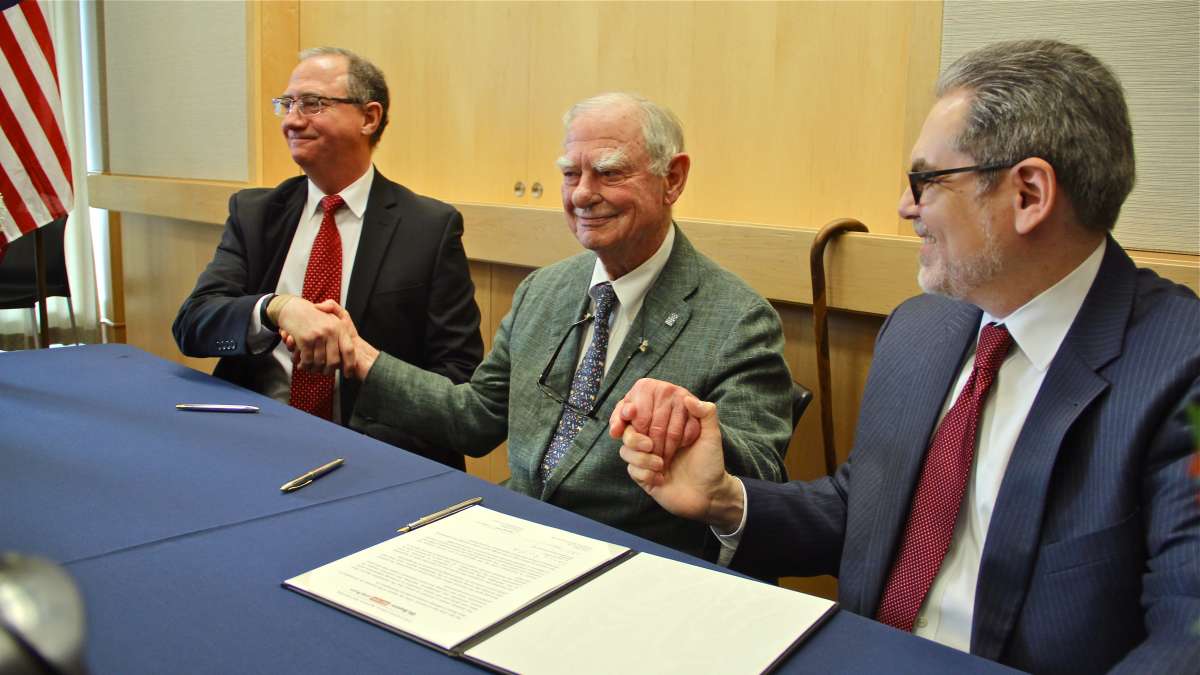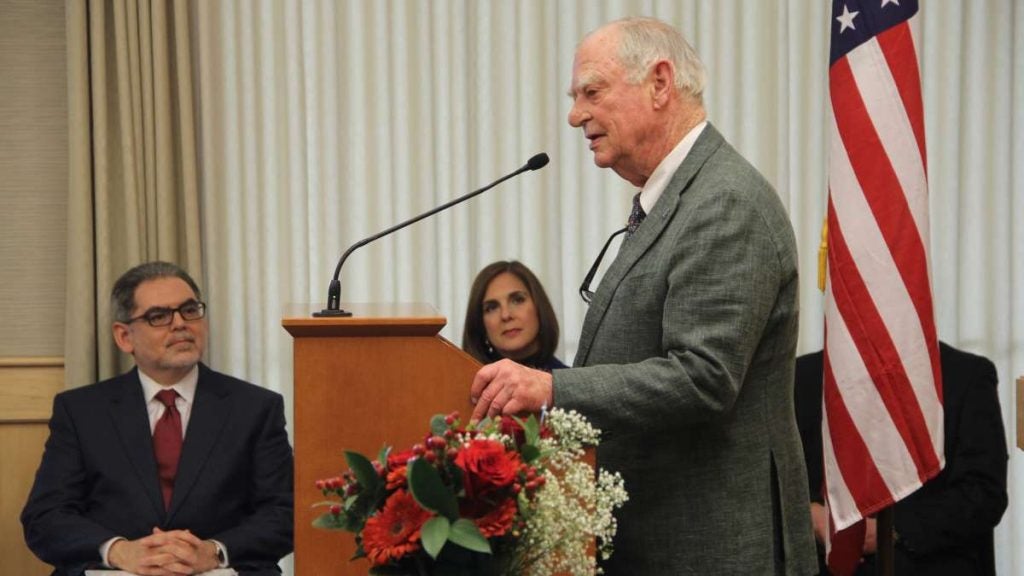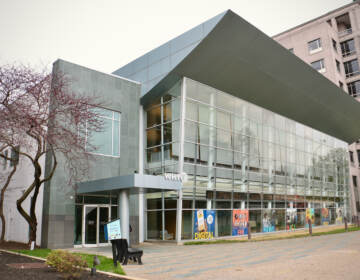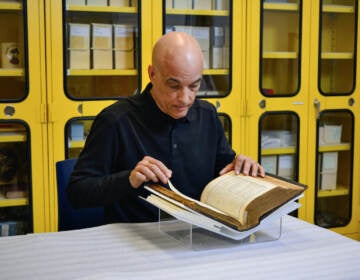Influential Philadelphia philanthropist H.F. ‘Gerry’ Lenfest dies at 88
After months of declining health, Lenfest was taken to Penn Presbyterian Medical Center where he was pronounced dead Sunday morning, according to Philly.com

H.F. "Gerry" Lenfest, center, has died at the age of 88. He is pictured here shaking hands with Pedro Ramos (right), head of the Philadelphia Foundation, and Philadelphia Media Network publisher Terry Egger, after signing over his media company to the foundation in 2016. (File, Emma Lee/WHYY)
Updated: 5:40 p.m.
—
H.F. “Gerry” Lenfest, the man who was arguably Philadelphia’s most influential philanthropist, has died at the age of 88.
After months of declining health, Lenfest was taken from his home on Rittenhouse Square to Penn Presbyterian Medical Center where he was pronounced dead Sunday morning.
A memorial service is being planned in Philadelphia in September.
In 2000, Lenfest and his wife Marguerite sold their cable business, Lenfest Communications, Inc., to Comcast and used the proceeds to give away more than $1.3 billion over the next two decades, according to Philly.com. Among the institutions that received their philanthropic support were the Philadelphia Museum of Art, the Museum of the American Revolution, the Chesapeake Bay Foundation, Drexel University, the Kimmel Center for the Performing Arts, and the Fund for the Philadelphia School District, according to Philly.com.
“There is likely not an organization or charity in Philadelphia that didn’t benefit from the Lenfest family’s generosity in some way,” said Pennsylvania Gov. Tom Wolf in a statement. “From the arts to education to journalism, Gerry understood that the key to building a strong economy and community were strong civic institutions that enriched the lives of all citizens.
“Put simply, Gerry was a great human being and an even better citizen. Frances and I offer our deepest condolences to the Lenfest family and ask all Pennsylvanians to join us in remembering and celebrating the life of Gerry Lenfest. We will miss him.”
The Lenfests also supported WHYY’s Youth Media Labs program and “On Stage at Curtis.”
“Gerry didn’t have to, but chose to support a broad range of endeavors in our community when they helped to deepen the life experience for people of all walks of life in the Greater Philadelphia community,” said WHYY President and CEO Bill Marrazzo. “WHYY’s audiences were grateful, no exception.
“Gerry’s largesse can be found across all pillars of WHYY core services: expanding the impact of our news and information efforts at a time when journalism is seriously challenged, using WHYY’s media reach to amplify the creativity of our cultural arts partners, and supporting our Youth Media Labs program, which enables students on scholarship to develop digital literacy schools, opening up pathways for their career choices.
“On a personal note, Gerry was a kind and thoughtful friend. While we will miss him, he will not, and should not, ever be forgotten. In his life, he made a huge difference for us all.”
Lenfest’s ‘most important’ act
Despite a significant decline in his physical health, Lenfest was still actively engaged in what he called his “most important” project as recently as three weeks ago.
Stan Wischnowski, executive editor of Philadelphia Media Network, said Lenfest was “sharp as a tack” during the most recent PMN board meeting on July 17, which he joined by phone.
In 2014, Lenfest and his business partner, Lewis Katz, bought the city’s two largest newspapers, the Philadelphia Inquirer and the Philadelphia Daily News, and the news website Philly.com — the three entities that make up PMN. (Lenfest and Katz had been part of a six-person ownership group since 2012.)
Their goal was not only to boost revenues, but also to improve coverage of the region.
“If we have a better product, we give the support the staff needs to have a better product, and we increase readership,” he told WHYY at the time. “That would be the basis for improvement in advertising.”
Lenfest became PMN’s sole owner when Katz died in a plane crash.
In 2016, he donated PMN to a newly-created nonprofit, now known as the Lenfest Institute for Journalism.
“Of all the things I’ve done, this is the most important. Because of the journalism,” he said.

The institute’s executive director, Jim Friedlich remembers Lenfest in a piece for Philly.com as an astute and prescient businessman, who said he wanted to find ways to harness digital technology to “enable and ennoble news, rather than to destroy it.”
“But Gerry’s most keen observation — and this was in 2015 — was that we were entering an era of fake news,” Friedlich wrote. “He warned that as the news business got tougher, some in power would take advantage of its weakness. As Gerry put it, ‘On the Internet you don’t know what’s real and what’s not. Before long, we won’t know what to believe.’ ”
Now that his warning has become a reality, many in the media business are closely watching the Lenfest Institute in its mission to bolster the local press.
The institute has supported journalism initiatives at a number of local news outlets. At WHYY, a grant from the nonprofit is funding an effort to create culturally competent newsrooms, work with community on storytelling, and collaborate with other mainstream and multicultural news media for trainings and producing stories.
Other projects funded by the institute include expanding PMN’s investigative team, an effort by a Cambridge, Mass.-based company to build a marketplace for local podcast advertising, as well as the Philadelphia Solutions Journalism project — a collaboration involving 19 local news outlets focusing on solutions to the city’s chronic issues.
And Lenfest made his priorities clear for where the grant money should go, Wischnowski said.
“He focused on technology advancements, diversifying the newsroom so it could better reflect the community,” he said. “And he was very, very adamant about preserving accountability, watchdog journalism.”
That level of specificity showed that Lenfest — and his wife, Marguerite, who Wischnowski said was “very key to his business success” and a partner in all of his major philanthropic decisions — was more than a large checkbook.
“Talk about a great American,” Wischnowski said.
His early life
Though the Lenfests lived a luxurious life with yachts, expensive cars and multiple homes, friends described them as down-to-earth. They spent much of their time at their house in Huntingdon Valley, which they bought for $35,000 in 1966. With no help, the Lenfests cooked for guests.
Lenfest and his twin sister, Marie, were born in 1930 in Jacksonville, Florida, but soon moved to Scarsdale, New York, where their father worked in the shipping industry.
When Lenfest was 13, the family moved to a farm near Lambertville, New Jersey, where Lenfest had no shortage of chores. He went to Flemington High School and graduated from Mercersburg Academy in south-central Pennsylvania.
He graduated from Washington and Lee with a degree in economics in 1953, served with the Navy in Norfolk, Virginia, and got his law degree from Columbia.
He worked for a New York law firm before landing a job in 1965 with Walter Annenberg’s Triangle Publications, which owned TV Guide, Seventeen magazine, several TV and radio stations, and cable franchises.
In 1973, Annenberg decided to sell the cable assets. Lenfest, with the help of two investors, ended up buying the system in Lebanon, Pennsylvania.
—
The Associated Press contributed to this report.
WHYY is your source for fact-based, in-depth journalism and information. As a nonprofit organization, we rely on financial support from readers like you. Please give today.




